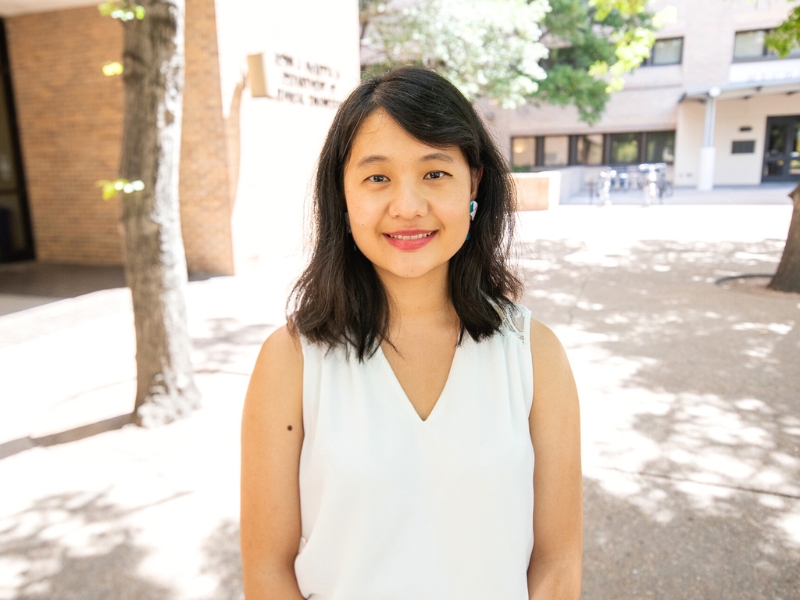Back to Faculty Directory

wwwennie@austin.utexas.edu
512-471-9894
Office Location: CPE 4.450
Wennie Wang
Assistant Professor
Miller Faculty Fellowship
Research Presentation for Prospective Graduate Students
Educational qualifications
Postdoctoral Scholar, University of Chicago (2018-2021)
Ph.D., Computational Materials, University of California, Santa Barbara (2018)
B.S., Materials Science and Engineering, Massachusetts Institute of Technology (2013)
Focus
Catalysis, energy conversion, and next-generation computing applications.
Research
First-principles computational methods of extended systems for a microscopic understanding of optical, electronic, and transport properties in energy sustainability technologies.
Computational Engineering of Optoelectric Materials
Our group utilizes and deploys computational methods to engineer the optical, electronic, and transport properties of materials in energy sustainability technologies. Enabled by high performance computing (HPC), we seek to elucidate and predict the materials properties at the microscopic level using first-principles calculations, drive the exploration of novel materials platforms, and create strategies that directly couple to experiments. In particular, we look to understand and harness defects in materials for optoelectronic devices. Research in the group is highly interdisciplinary and draws upon fields such as chemical engineering, materials science, and solid-state physics.
Throughout our research and teaching efforts, we strive to create and foster a diverse, equitable, and inclusive environment.
Honors & Awards
- Maria Goeppert Mayer Award, American Physical Society (APS), 2025
- Ken Hass Outstanding Student Paper Award for Industrial Applications, Runner-up, APS, 2018
- Materials Research Society (MRS) Fall Graduate Student Award finalist, Silver Award, 2017
- Excellence in Research Fellowship (UCSB Institute for Energy Efficiency), 2017-2018
- National Science Foundation (NSF) Graduate Research Fellow (GRFP), 2014
- Holbrook Foundation Fellowship (UCSB Institute for Energy Efficiency), 2013-2014
Selected Publications
- R. Anvari, W. Wang. “Nature of point defects in monolayer MoS2 and the MoS2/(111)-Au heterojunction.” J. Appl. Phys. 135, 174304 (2024). Defects in Semiconductors 2024 special edition. [doi: 10.1063/5.0205981] [arXiv]
- G. Melani, W. Wang, F. Gygi, K.-S. Choi. G. Galli. “Effects of solvation and temperature on the energetics of BiVO4 surfaces with varying composition for solar water splitting.” ACS Energy Letters, 9, 10, 5166-5171 (2024). [doi: 10.1021/acsenergylett.4c01913] [arXiv].
- W. Wang*, M. Favaro*, E. Chen^, L. Trotochaud, H. Bluhm, K.-S. Choi, R. van de Krol, D.E. Starr, G. Galli. “Influence of excess charge on water adsorption on the BiVO4 (010) surface.” J. Am. Chem. Soc., 144, 37, 17173–17185 (2022) [doi : 10.1021/jacs.2c07501].
- H. Vo*, S. Zhang*, W. Wang*, G. Galli, “Lessons learned from first-principles calculations of transition metal oxides.” J. Chem. Physics. (2021) Special Collection: in honor of Women in Chemical Physics and Physical Chemistry. 154, 174704 (2021) [doi: 10.1063/5.0050353]
- D. Lee,* W. Wang*, C, Zhou *, X. Tong, M. Liu, G. Galli, K.-S. Choi. “The impact of surface composition on the interfacial energetics and photoelectrochemical properties of BiVO4 .” Nature Energy. 6, 287 (2021)[doi: 10.1038/s41560-021-00777-x] [UChicago News release][BNL news release]
- A. Lindberg*, W. Wang*, S. Zhang, G. Galli, K.-S. Choi. “Can a PbCrO4 photoanode perform as well as isoelectronic BiVO4?” ACS Appl. Energy Mater. (2020) [doi: 10.1021/acsaem.0c01250]
- H. Ma, W. Wang, S. Kim, M.H. Cheng, M. Govoni, G. Galli. “PyCDFT: a Python package for constrained density functional theory.” J. Comp. Chem. 41, 1859 (2020) [doi: 10.1002/JCC.26354] [open-source code]
- W. Wang, P. Strohbeen, D. Lee, C. Zhou, J. Kawasaki, K.-S. Choi, M. Liu, G. Galli. “The role of surface oxygen vacancies in BiVO4.” Chemistry of Materials. 32, 2899-2909 (2020). [doi: 10.1021/acs.chemmater.9b05047]
- W. Wang, Y. Kang, H. Peelaers, K. Krishnaswamy, C.G. Van de Walle. “First-principles study of transport in WO3.” Phys. Rev. B. 101, 045116 (2020). [doi: 10.1103/PhysRevB.101.045116]
- X. Zhang, J.X. Shen, W. Wang, C.G. Van de Walle. “First-principles Analysis of Radiative Recombination in Lead-Halide Perovskites.” ACS Energy Letters. 3, 2329-2334 (2018). [doi: 10.1021/acsenergylett.8b01297]
- W. Wang, H. Peelaers, J.X. Shen, C.G. Van de Walle. “Carrier-induced absorption as a mechanism for electrochromism in WO3.” MRS Communications. 8, 926-931 (2018), [doi:10.1557/mrc.2018.115]
- W. Wang, H. Peelaers, J.X. Shen, A. Janotti, C.G. Van de Walle. “Impact of point defects on electrochromism in WO3.” Proc. SPIE 10533, Oxide-based Materials and Devices IX; 10533C (2018), [doi: 10.1117/12.2303688]
- W. Wang, A. Janotti, C.G. Van de Walle. “Phase transformations upon doping in WO3.” J. Chem. Phys., 146, 214504 (2017), [doi: 10.1063/1.4984581]
- W. Wang, A. Janotti, C.G. Van de Walle. “Role of oxygen vacancies in crystalline WO3.” J. Mat Chem. C, 4, 6641 – 6648 (2016), [doi: 10.1039/C6TC01643J]
Affiliations
- Faculty, Allen J. Bard Center for Electrochemistry
- Core Faculty, The Center for Dynamics and Control of Materials: A Materials Research Science and Engineering Center (MRSEC)
- Affiliated Faculty, Oden Institute (GSC)
- Core Faculty, Texas Materials Institute (TMI)






